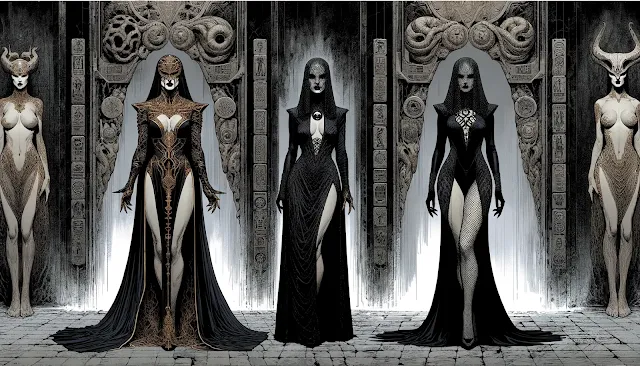This theme is not merely a backdrop but a driving force that propels the characters into action, confronts them with their limitations, and ultimately defines the course of events in the novel.
Fate and the Inevitability of Destiny
The experiences of Paul Atreides and his father, Duke Leto, are pivotal in illustrating the theme of fate as an inescapable force. Duke Leto's fate is sealed by his conflict with the Harkonnens, a destiny that unfolds despite his astute political maneuvering and attempts at safeguarding his family's future on the desert planet of Arrakis.His death, seemingly preordained, serves as a stark reminder of the limitations of individual action in the face of larger, uncontrollable forces.
Paul Atreides' journey further explores this tension between fate and free will. Gifted with prescience, Paul stands at the crossroads of potential futures, his visions offering him glimpses of a violent jihad that he seeks to avert.
Paul Atreides' journey further explores this tension between fate and free will. Gifted with prescience, Paul stands at the crossroads of potential futures, his visions offering him glimpses of a violent jihad that he seeks to avert.
Despite his extraordinary abilities and his attempts to alter the course of events—such as adopting the name Paul-Muad'Dib to influence his destiny—Paul confronts the harsh reality that some future events are beyond his control.
This realization underscores a critical aspect of Herbert's exploration: the notion that even those with the power to foresee and attempt to change the future are ultimately bound by the threads of fate.
In conclusion, "Dune" offers a rich and nuanced exploration of fate and free will, challenging readers to consider the delicate balance between destiny and agency. Through the experiences of its characters and the actions of groups like the Bene Gesserit, Frank Herbert crafts a narrative that delves deep into the heart of these timeless themes, leaving a lasting impact on the science fiction genre and philosophical thought.
The Bene Gesserit: Architects of Free Will
In stark contrast to the portrayal of individual destiny as largely predetermined, the Bene Gesserit sisterhood exemplifies the potential of collective action and long-term planning to shape the future. Through their meticulous breeding program, aimed at producing the Kwisatz Haderach, the Bene Gesserit demonstrate a profound belief in the power of free will to direct the course of human evolution and history.Their success in influencing the birth of Paul Atreides, who fulfills their prophecy, stands as a testament to their ability to manipulate genetic and historical narratives to achieve desired outcomes.
The Missionaria Protectiva, another facet of the Bene Gesserit's influence, reveals their mastery over cultural and religious narratives to shape societal beliefs and actions. By planting the seeds of prophecy among the Fremen, they not only pave the way for Paul's acceptance as a messianic figure but also showcase the power of constructed destiny to alter the course of events.
The Missionaria Protectiva, another facet of the Bene Gesserit's influence, reveals their mastery over cultural and religious narratives to shape societal beliefs and actions. By planting the seeds of prophecy among the Fremen, they not only pave the way for Paul's acceptance as a messianic figure but also showcase the power of constructed destiny to alter the course of events.
This strategic manipulation of belief and destiny highlights the Bene Gesserit's nuanced understanding of free will—not as an individual's capacity to make choices in isolation but as a collective ability to influence and redirect the flow of history.
 |
| Concept art of the Bene Gesserit |
The Duality of Fate and Free Will in "Dune"
"Dune" presents a complex interplay between fate and free will, suggesting that while individual destinies may be bound by the forces of fate, there exists the potential for collective action and strategic foresight to alter the course of history.However, Herbert does not offer simple resolutions; instead, he portrays a universe where the threads of fate and the efforts of free will are intricately intertwined. Paul's realization that the jihad will unfold regardless of his actions, and the Bene Gesserit's manipulation of cultural narratives, reflect the multifaceted nature of destiny and agency.
Herbert's exploration goes beyond the confines of the novel, touching on existential questions that resonate with the human experience. The tension between the desire to control one's destiny and the recognition of forces beyond one's control mirrors the dilemmas faced by individuals and societies throughout history.
Herbert's exploration goes beyond the confines of the novel, touching on existential questions that resonate with the human experience. The tension between the desire to control one's destiny and the recognition of forces beyond one's control mirrors the dilemmas faced by individuals and societies throughout history.
"Dune" invites readers to ponder the extent of their agency, the nature of destiny, and the possibility of shaping the future—not through the isolated actions of individuals but through the collective will and strategic planning of groups dedicated to altering the course of history.
In conclusion, "Dune" offers a rich and nuanced exploration of fate and free will, challenging readers to consider the delicate balance between destiny and agency. Through the experiences of its characters and the actions of groups like the Bene Gesserit, Frank Herbert crafts a narrative that delves deep into the heart of these timeless themes, leaving a lasting impact on the science fiction genre and philosophical thought.


















